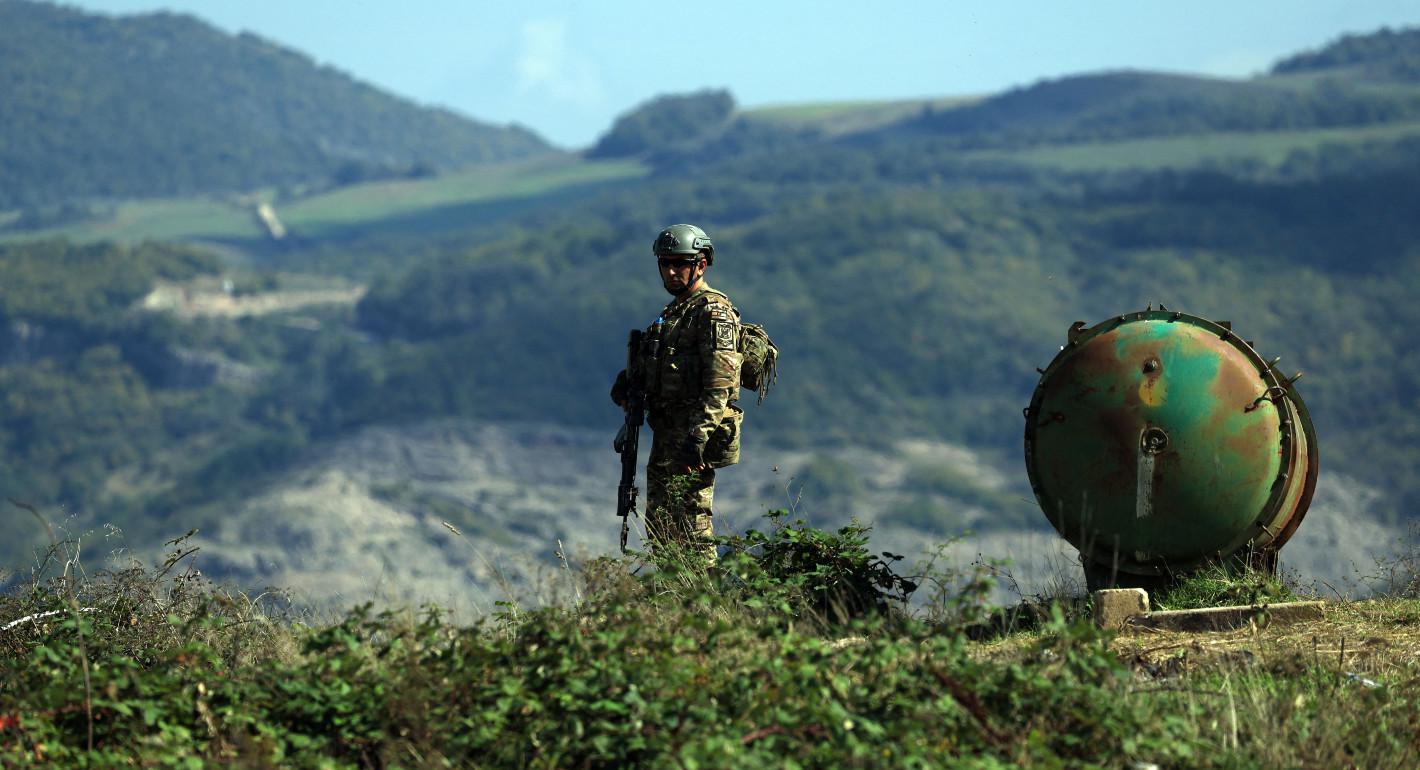With the blocking of Starlink terminals and restriction of access to Telegram, Russian troops in Ukraine have suffered a double technological blow. But neither service is irreplaceable.
Maria Kolomychenko
{
"authors": [
"Alper Coşkun"
],
"type": "commentary",
"centerAffiliationAll": "dc",
"centers": [
"Carnegie Endowment for International Peace"
],
"collections": [
"Türkiye and the World",
"European Politics",
"Aso Tavitian Initiative"
],
"englishNewsletterAll": "",
"nonEnglishNewsletterAll": "",
"primaryCenter": "Carnegie Endowment for International Peace",
"programAffiliation": "EP",
"programs": [
"Europe"
],
"projects": [],
"regions": [
"Middle East",
"Türkiye",
"Caucasus",
"Russia",
"Azerbaijan",
"Armenia",
"Iran"
],
"topics": [
"Security"
]
}
Source: Getty
It would need to take bold action and leadership while outmaneuvering Russia’s obstructive strategies.
In an unexpected and swift offensive on September 19, Azerbaijan took control over Nagorno-Karabakh, triggering a mass exodus of the civilian Armenian population and prompting experts to declare the beginning of the end of the long-standing territorial dispute. Just five days later, Turkish President Recep Tayyip Erdoğan visited Nakhchivan, an Azerbaijani exclave on Türkiye’s border, where he was hosted by Azerbaijani President Ilham Aliyev. The timing of this visit, the messages that were delivered, and its venue were full of symbolism. Erdoğan and Aliyev celebrated Azerbaijan’s victory, renewed mutual pledges of solidarity, and referenced a prospective land corridor from Nakhchivan through Armenia linking their two countries.
The visit was a show of force in disregard of international statements of concern for the humanitarian situation and condemnations of Azerbaijan’s unilateral action. But amid the events, a silver lining may emerge: the end of the conflict and a prospective peace deal between Armenia and Azerbaijan could pave the way for a more extensive process of regional normalization involving Türkiye.
The region’s fraught history and numerous failed attempts in the past suggest the odds of success are meager, but the convergence of two factors may be reason for optimism—especially if Türkiye decides to take the lead.
The first factor is the end of the long-held Armenian dream of independence for Nagorno-Karabakh. This paradigm shift settles Azerbaijan’s expectations by restoring its territorial integrity. It also liberates Türkiye’s hand in pursuing full normalization with Armenia, since the issue of Nagorno-Karabakh has always been a major stumbling block.
The second factor is the opportunity presented by the realistic and forward-looking position taken by Armenian Prime Minister Nikol Pashinyan, exemplified in his constructive engagement with Türkiye and his readiness to recognize Azerbaijan’s territorial integrity. Pashinyan, however, is under pressure and finds himself in a fragile situation. After last month’s events, Armenians are showing signs of rising resentment. In addition, Russia is unhappy with Pashinyan’s pro-Western stance and is warning about an “unenviable future” for him.
The mass influx of Nagorno-Karabakh Armenians, especially as winter approaches, will raise the domestic stakes for Pashinyan, and Russia will see this as an opportunity to increase the prospects of his downfall. This is where Azerbaijan and Türkiye need to play their cards wisely. They should not gloat or put additional pressure on Pashinyan but rather buttress him by displaying their commitment to peace and stability for all in the region. In doing so, they would be strengthening Pashinyan’s hand in pursuit of such an agenda and testing his resolve to work for normalization.
Should Ankara put its energy into a sincere effort for regional reconciliation, convince a potentially reluctant Baku to join the effort, and rally the support of the United States and others, the odds may shift in favor of achieving sustainable peace. This cannot happen overnight and would involve an arduous process of negotiation. But any momentum in that direction would be welcome.
A state of rivalry and conflict in the South Caucasus benefits Russia greatly. It provides opportunities for Moscow to play regional actors against each other and to influence developments and outcomes, including through mediation and peacekeeping roles. This is the standard Russian playbook, and throughout the years, Nagorno-Karabakh has been the perfect case study.
Russia’s deteriorating relations with Armenia under Pashinyan and its conversely deepening partnership with Azerbaijan are major factors in recent events. Just last year, Aliyev and Russian President Vladimir Putin signed a Declaration on Allied Interaction, reflecting a qualitative improvement in their partnership. Pashinyan, on the other hand, recently made the point that his country can no longer rely on Russia. He was proven right: the inaction of the Russian peacekeepers, who were deployed after the 2020 clashes in Nagorno-Karabakh, enabled Azerbaijan’s latest offensive. They allowed Azerbaijan to prevail over the vastly inferior Armenian forces, marking a shift in Russia’s long-standing policy of maintaining a balance between the conflicting sides.
The combination of Russia’s developing partnership with Azerbaijan and its close relationship with Türkiye—Azerbaijan’s staunchest ally—raises the question of whether the three have recently actively coordinated against Armenia. While the image of a trilateral convergence between the three cannot be denied, the nature of their relations is complex.
Though not immediately evident from their recent closeness, Türkiye and Russia are in constant rivalry, which historically has played out in places like the Caucasus and Central Asia. Normalization of relations in the South Caucasus would open new avenues of cooperation and connectivity in the region, allowing Türkiye to assume a leading role and reap significant political, economic, and commercial benefits. This would translate into growing geopolitical clout for the country, and from Moscow’s zero-sum perspective, likely be seen as coming at Russia’s expense.
Russia is aware of this risk and can be expected to try and offset it in two ways, first, by reinstating its influence over Armenia through a like-minded replacement for Pashinyan. Moscow’s distaste for Pashinyan is rising, so assuming that Russia would welcome a change of guard in Yerevan—and might even be contemplating ways to facilitate it—would not be far-fetched. The aim would be to reverse Armenia’s orbit toward the West and ensure that it does not meaningfully engage in advancing regional normalization, which Moscow would see as primarily a benefit to Türkiye.
Russia’s second line of effort focuses on appeasing Türkiye and Azerbaijan and seizing opportunities to deepen the fault line between them and the West. It does so through calibrated messaging and actions that would resonate positively. Russia’s choice to look the other way as Azerbaijan took over Nagorno-Karabakh was no coincidence. It was a way to kill two birds with one stone by punishing pro-western Armenia and rewarding a like-minded and increasingly pliant Azerbaijan.
Erdoğan recently stated that he trusts Russia just as much as his Western allies. His intention may have been more about scorning the West than praising Russia, but that doesn’t change the fact that he doesn’t trust either side. Putin’s advantage lies in his ability to get the best of Erdoğan by playing on his not-so-secret antagonism with the West. The problem for Ankara is that Russia finds it easier to call the shots and impose its will when Türkiye is isolated. Erdoğan is no stranger to that reality and should know better.
Whether Russia has already put a price tag on its silent approval of Azerbaijan’s latest offensive on Nagorno-Karabakh is unclear. The reality is that its peacekeeping role and the responsibility it assumed to “oversee transport connections,” including between Nakhchivan and western Azerbaijan, gives it considerable leverage.
Despite the many pitfalls, the moment for Türkiye to take another bet on advancing peace and normalization in the South Caucasus may have arrived. If it decides to push in this direction, it needs to set up some firm guardrails, take the lead in displaying its commitment, and be prudent.
First, any effort has to rest on the firm understanding that all nations’ independence, sovereignty, and internationally recognized territorial integrity are sacrosanct. Reiterating its unwavering commitment to these principles should be Türkiye’s starting point, and it should try to do this in conjunction with Azerbaijan. This would serve to have a restraining effect on any misguided and adventurous impulses among regional players, and it could alleviate Armenia’s worries that with the tide having turned to its disadvantage, it may be subject to additional demands.
Second, Türkiye would need to be ready to lead by example in reconciliation efforts and have a set of ideas ready for implementation. This could include various confidence-building measures, including humanitarian support for displaced civilians and an immediate partial opening of its border with Armenia (initially for third-country nationals and government officials, as had been discussed). Ankara could also initiate negotiations with Yerevan on issues such as the complete opening of the state border, with a commitment to implement the opening once Armenia and Azerbaijan sign a peace treaty. The operationalization of the transport line linking Nakhchivan and western Azerbaijan, as well as the gradual inclusion of Armenia in the work and bodies of the Trans-Caspian East-West Middle Corridor Initiative championed by Türkiye, can be items of discussion within this context. Moreover, Ankara would do well to begin socializing the possibilities for deepening economic ties across the South Caucasus, including with Armenia, Azerbaijan, and Georgia. Türkiye can spearhead more economic integration, using both investment and its own market as drivers. If more people in the South Caucasus believe in a better economic future, then there will be greater likelihood for political stability within and across countries.
Third, Türkiye was badly burned in the past when it sought reconciliation with Armenia. Azerbaijan threw a wrench in the works, alleging it had not been adequately consulted and, more importantly, disagreeing with the premise of the path to normalization while its territories were still under Armenian occupation. The lesson from this experience is that Türkiye needs to stay in sync with Azerbaijan. At times, it may need to assert its opinion. The relations between Ankara and Baku have progressed immensely since those days. Yet, the two occasionally prefer different means to the same end. Now that Azerbaijan’s territorial integrity has been restored, untapping the larger benefits of full normalization in the South Caucasus should be the overriding goal.
If this is indeed “the century of Türkiye,” as the Erdoğan government’s propaganda machine is keen on reminding Turks and the rest of the world, why not begin this era with a quest for peace in the South Caucasus? And if Türkiye does step up to the plate, its Western allies should follow suit.
Carnegie does not take institutional positions on public policy issues; the views represented herein are those of the author(s) and do not necessarily reflect the views of Carnegie, its staff, or its trustees.
With the blocking of Starlink terminals and restriction of access to Telegram, Russian troops in Ukraine have suffered a double technological blow. But neither service is irreplaceable.

Maria Kolomychenko
Over the past two decades, regional collaboration in the South Caucasus has intensified. Turkey and the EU should establish a cooperation framework to accelerate economic development and diversification.



Feride İnan, Güven Sak, Berat Yücel
In this moment of geopolitical fluidity, Türkiye and Iraq have been drawn to each other. Economic and security agreements can help solidify the relationship.


Derya Göçer, Meliha Altunışık
The main source of Russian aggression is a profound mistrust of the West and the firm belief that it intends to inflict a “strategic defeat” on Russia. As long as this fear persists, the war will not end.

Tatiana Stanovaya
Europe’s interests in Syria extend beyond migration management, yet the EU trails behind other players in the country’s post-Assad reconstruction. To boost its influence in Damascus, the union must upgrade its commitment to ensuring regional stability.


Bianka Speidl, Hanga Horváth-Sántha